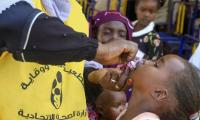DERA ISMAIL KHAN: Jamiat Ulema-e-Islam-Fazl (JUI-F) chief Maulana Fazlur Rehman on Sunday said that politicians were being persecuted on the pretext of justice.
Addressing Ghalba-e-Islam Conference at the Haq Nawaz Park here on Sunday, the JUI-F chief said that an elected prime minister was sent packing but nobody could question a chief minister who had been accused of corruption by his own party lawmakers.
He said that Imran Khan and his party had been bragging about justice in Khyber Pakhtunkhwa, but deplored that the justice had not been seen anywhere in the province.
"The PTI established Ehtesab Commission but when it sensed that the commission was laying hand on its chief minister the commission's chairman was removed," he claimed.
He said Pakistan Tehreek-e-Insaf (PTI) claims of change were mere rhetoric to deceive the voters as no visible change could be noticed in the province.
"The mismanagement in the province is at peak and every institute is in disarray," he said, adding that the Muttahida Majlis-e-Amal (MMA) would reform the system after coming into power as a result of the general election.
The real change and real democracy is only possible when masses trust institutions and institutions trust political leaders, he said, adding, Imran Khan had claimed that "few tomatoes were rotten in his basket."
He was unaware of the real situation as his basket was full of rotten tomatoes, the JUI-F chief remarked.
Maulana Fazlur Rehman also urged the religious forces to unite in the face of challenges.
The JUI-F chief said that the ulema had been taunted for not being united but the revival of the MMA had silenced the critics. "The MMA would foil conspiracies against the religious parties," Maulana Fazlur Rehman added.
Session of National Assembly on April 7th will be the 15th session of Sixteenth National Assembly
FEC member Shafiq Awan announced that consultations for an intensified protest strategy were ongoing
Film features stellar cast, including Samina Peerzada, Javed Sheikh, Faysal Quraishi, Sonya Hussyn, Bushra Ansari
Under new amendment, PM will be able to delegate duties as in-charge minister to ministers of state and advisers
Ali Tahir has been appointed at the Federal Ombudsman Secretariat
Delegation requested BNP leaders to end their protest and disperse peacefully







